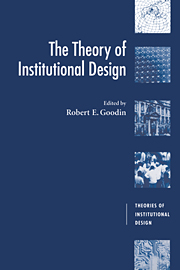Book contents
- Frontmatter
- Contents
- Notes on Contributors
- Preface
- 1 Institutions and Their Design
- 2 Institutional Design and Rational Choice
- 3 Second Best Theories and the Implications for Institutional Design
- 4 The Informal Logic of Institutional Design
- 5 Institutional Morality
- 6 The Publicity Principle
- 7 Designing Institutions in East European Transitions
- 8 Political Deals in Institutional Settings
- 9 Self-inventing Institutions: Institutional Design and the U.K. Welfare State
- 10 Selection and the Currency of Reward
- Name Index
- Subject Index
4 - The Informal Logic of Institutional Design
Published online by Cambridge University Press: 05 August 2012
- Frontmatter
- Contents
- Notes on Contributors
- Preface
- 1 Institutions and Their Design
- 2 Institutional Design and Rational Choice
- 3 Second Best Theories and the Implications for Institutional Design
- 4 The Informal Logic of Institutional Design
- 5 Institutional Morality
- 6 The Publicity Principle
- 7 Designing Institutions in East European Transitions
- 8 Political Deals in Institutional Settings
- 9 Self-inventing Institutions: Institutional Design and the U.K. Welfare State
- 10 Selection and the Currency of Reward
- Name Index
- Subject Index
Summary
When assessing or contemplating interventions in processes of institutional design we should attend closely to the way these interventions reinforce, reshape, or undermine particular discourses. This is what I mean by the informal aspect of institutional design. A discourse is a framework for apprehending the world embedded in language, enabling its adherents to put together diverse bits of sensory information into coherent wholes. These adherents therefore share assumptions and capabilities, which they will typically take for granted, often unaware even of the possibility of alternatives to them.
“Discourse” in this sense was popularized by Michel Foucault, who made a career out of exposing contingency and discontinuity in discourses about criminality, insanity, illness, sex, and so forth. To Foucault, individuals are largely the creations of the discourses which they engage, and so generally incapable of rational choices across discourses. A Foucauldian commitment to the general impenetrability and hegemony of discourses implies scornful dismissal of the idea of institutional design, on the grounds that any such project would either perpetuate old kinds of repression, or at best institute new ones. Foucault himself softened the severity of these commitments toward the end of his life. Here, I will depart from a Foucauldian position to suggest that while discourses do indeed exist, they are rarely hegemonic, that more than one discourse is normally available in any particular setting, that they are only partially incommensurable, that they are open to informed scrutiny and reconstruction at the margins, and that rational choices across them can indeed be made.
Society's discourses are intertwined with its institutions.
- Type
- Chapter
- Information
- The Theory of Institutional Design , pp. 103 - 125Publisher: Cambridge University PressPrint publication year: 1996
- 21
- Cited by



